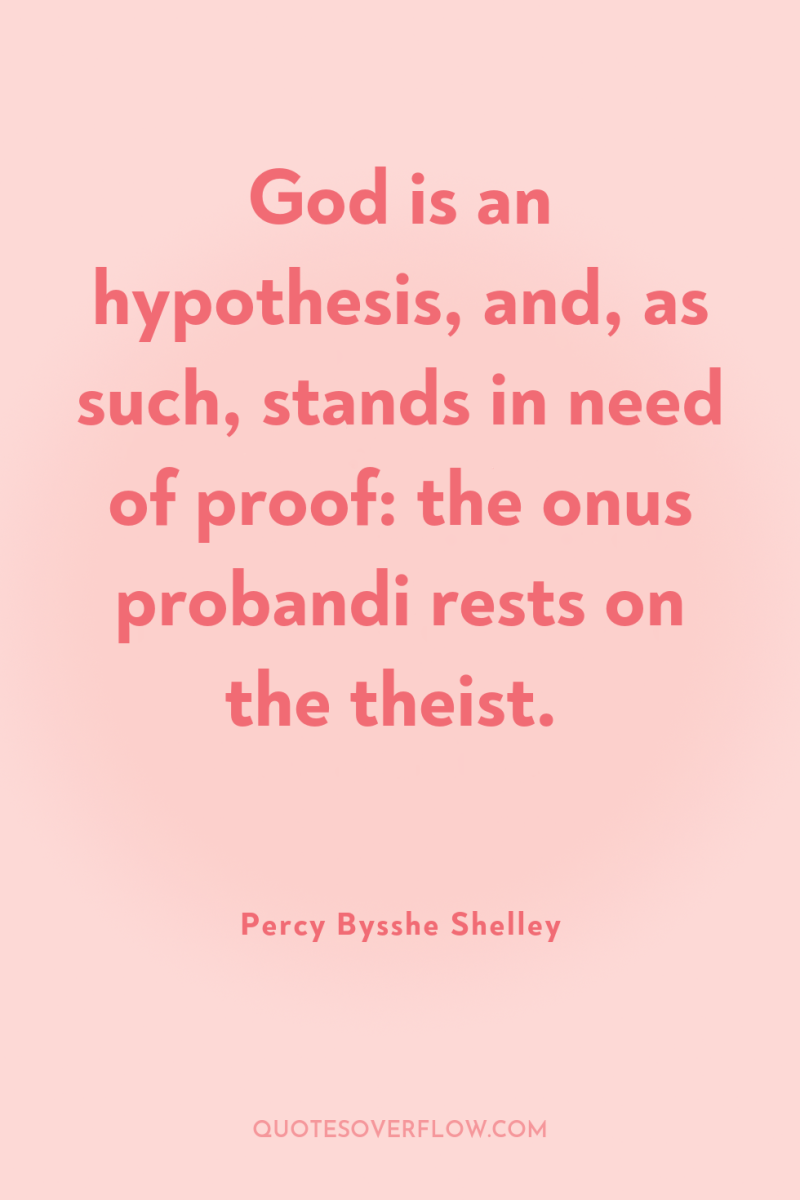1
I don't accept the currently fashionable assertion that any view is automatically as worthy of respect as any equal and opposite view. My view is that the moon is made of rock. If someone says to me 'Well, you haven't been there, have you? You haven't seen it for yourself, so my view that it is made of Norwegian Beaver Cheese is equally valid' - then I can't even be bothered to argue. There is such a thing as the burden of proof, and in the case of god, as in the case of the composition of the moon, this has shifted radically. God used to be the best explanation we'd got, and we've now got vastly better ones. God is no longer an explanation of anything, but has instead become something that would itself need an insurmountable amount of explaining. So I don't think that being convinced that there is no god is as irrational or arrogant a point of view as belief that there is. I don't think the matter calls for even-handedness at all.Douglas Adams

2
God is an hypothesis, and, as such, stands in need of proof: the onus probandi rests on the theist.Percy Bysshe Shelley
3
I do not pretend to be able to prove that there is no God. I equally cannot prove that Satan is a fiction. The Christian god may exist; so may the gods of Olympus, or of ancient Egypt, or of Babylon. But no one of these hypotheses is more probable than any other: they lie outside the region of even probable knowledge, and therefore there is no reason to consider any of them.Bertrand Russell
4
For God to prove himself on demand, physically, would be a grave disappointment, and the strongest Christians should be considerably grateful that he chooses not to do so. The skeptic endlessly demands proof, yet God refuses to insult the true intelligence of man, the '6th sense', the chief quality, the acumen which distinguishes man from the rest of creation, faith.Criss Jami
5
...if you ask me whether or not I'm an atheist, I wouldn't even answer. I would first want an explanation of what it is that I'm supposed not to believe in, and I've never seen an explanation.Noam Chomsky
6
Shrines! Shrines! Surely you don't believe in the gods. What's your argument? Where's your proof?Aristophanes
7
A theist can't empirically prove that God exists but he believes in God because no one can allegedly disprove God's existence. By his logic, you must believe in anything you can't disprove. That means all things are real until disproved--including the tooth fairy, the Loch Ness Monster, Santa Claus, the Flying Spaghetti Monster, etc.G.M. Jackson
8
Either god exists or it doesn’t exist. If a god does exist, it either interacts with the universe in some detectable way or it doesn’t. If it doesn’t, that god is indistinguishable from a non-existent god. That only leaves a god who interacts with the universe in some detectable way. But if science, which is the greatest realization of the use of our senses to, you know, detect things, hasn’t found this god, that doesn’t say much for individuals. In short, the god you’ve created is, in fact, undetectable by science. The limits of science are not the province of religious knowledge. Where science is ignorant, so is religion. The only difference is that religion lacks the integrity of science.Matt Dillahunty
9
...what about the stone, Mr Lovegood? The thing you call the Resurrection Stone?""What of it?"" Well, how can that be real?"" Prove that it is not, " said Xenophilius.Hermione looked outJ.k. Rowling
10
If there's a god, it knows exactly what it would take to convince me and has refused to provide it. In fact, it has gone to great lengths to hide any evidence of its existence. That doesn't seem like a deity that wants to be worshiped to me.David G. McAfee
11
The Oracle pursued a logical course of confuting theism, and leaving 'a-theism' the negative result. It did not, in the absurd terms of common religious propaganda, 'deny the existence of God.' It affirmed that God was a term for an existence imagined by man in terms of his own personality and irreducible to any tenable definition. It did not even affirm that 'there are no Gods'; it insisted that the onus of proof as to any God lay with the theist, who could give none compatible with his definitions.J.M. Robertson